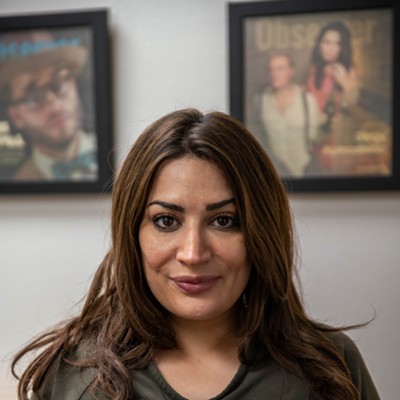The term “color-blind casting” is a showbiz buzzword that means assigning actors to roles without considering their race or ethnicity — or sometimes, gender. And while it’s a practice that’s been around almost as long as cinema itself, it’s become more prevalent in recent years, most notoriously on TV’s Grey’s Anatomy and the Broadway hit Hamilton.
While color-blind casting is meant to be inclusive, the practice isn't without criticism, as there are those who believe that — especially in the case of stories that depict the past — it inadvertently allows for a convenient erasure of segregation.
The Company of Rowlett Performers has been hiring female actors in male roles for many years, but, they say, their casting choices aren't meant as a statement — political, feminist or otherwise.
In October, the theater company did a production of Macbeth with an entirely female cast.
The idea, says CORP’s founder and artistic director Donna Covington, came when she brought in a new director, Nick Leos, and gave him creative carte blanche. Leos wanted an all-female cast.
“I said I want you to do something that’s dear to your heart,” Covington says she told the director, adding that she supported him in that decision but did caution him that not everyone would be thrilled.
“Just be very aware that you may struggle in getting an audience for this show,” Covington says she told Leos.
Last summer, the company put on the musical Godspell and hired actresses in the roles of Jesus and Judas. On that occasion, CORP did receive some complaints. But, Covington says, it’s impossible to appease everyone’s sensitivities.
“As an artistic director I walk a fine line between pleasing one part of my audience and pleasing the other half," Covington says. “Sometimes I just have to say, ‘Listen, I’m sorry if it offends you but we have to reach out into the community and we have to have accepting minds.'”
Part of the problem, she says, is that the theater company performs mostly in the suburbs, which aren’t areas known for their progressive values — even the theater-going crowds.
“We do performances in Garland. It’s not like we’re doing it down in Oak Lawn,” Covington says, referencing the Dallas area known as the “Gayborhood.” “We’re not doing it in Dallas where people are a little more open to those kinds of things. It’s an older community, an older generation of people that are quite traditionalist, ” she says.“People are like, ‘Why did you do that? Why did you go out on a limb?' For me it’s not a limb. It shouldn’t be an issue.” — Donna Covington
tweet this
CORP is on its 21st year. Originally, it came about as an after-school program for elementary school students when Covington was in charge of the PTA. When those kids graduated to middle school, the group turned the project into a legitimate theater company.
They normally do crowd-pleasing favorites like White Christmas and It’s a Wonderful Life.
“Everything about it is traditional,” Covington says of their regular programming. “But I’m not gonna shy away from casting against the grain.”
One longtime patron reached out through several mediums to communicate his displeasure at seeing a female portraying biblical characters, by emailing, posting on social media and texting her asking her to “return to some of your more traditional things.”
And part of that backlash, Covington says, was marked because of the religious element in the story. She points to one production of A Midsummer Night's Dream four or five years ago in which they cast female actors in the roles of the mechanicals. She says no one complained then.
“Not a word was said about that, so that’s what I thought was so hysterical,” Covington says.
The director says that when women are hired to play male roles, the character isn’t changed to female. Instead, the actresses are playing men, and they do so convincingly, while wearing short wigs and mustaches, even “grabbing themselves like men do.”
Covington says that some of the audience can’t even tell the difference. She also believes that the arts have a higher responsibility for setting standards for inclusivity.
“If in the theater world we don’t say that it’s OK, it's never gonna be OK,”she says of gender-blind casting.
Some of the major roles in the company’s current play, the Shakespeare comedy Much Ado About Nothing (which runs at Garland's Plaza Theater until Feb. 22), are male, but Covington cast female leads.
“It’s all about the acting — it comes down to that for me. ... I also like to give new talent opportunities to try new things," Covington says. “People are like, ‘Why did you do that? Why did you go out on a limb?' For me it’s not a limb. It shouldn’t be an issue.”
CORP is, if anything, continuing traditions set up in the Bard's own times, Covington says.
“Shakespeare is one of those things where I don’t feel like I have to ask for forgiveness, I don’t have to worry as much about offending; the Bard did it and I feel like we can do it,” she concludes with a laugh.
But the company isn't always able to abide by their own rules. The script for the company's next show, Red Velvet Cake War, arrived with a caveat written by the writers, indicating that under "by no means" should any women play men’s parts or vice versa.
“I’ve never seen that written in a script, but it’s there in bold,” Covington says. “They have intentions too; they have clear ideas about how they want it to look onstage as well.”
Covington explains that honoring this request to stick to the author's casting vision isn't merely a professional courtesy, but that in order to secure rights for a production, companies must abide by the directions in the script, or else they would be in violation of the agreement — especially if she chose to disregard a “blatant” direction of the sort.
CORP may respect, but not condone, that kind of inflexibility in the arts.
“I’m always about, can the actor or the actress pull off the part? And if they can do that, I don’t see what the problem is,” Covington says.
And the director also believes in a democratization of casting that goes both ways. Several Hollywood actors, most notably Scarlett Johansson, have come under fire for taking roles that could’ve gone to transgender or POC actors.
“If you’re the right person for the role and if you can make me believe in that character, why shouldn’t you get that part?" Covington says. "For me it always comes down to, if I can’t envision anyone else for that person playing that part — then that’s the person who should’ve played it — male or female.
“I have a lot of friends that are transgender. ... I’m in the theater world. When I look at [race and gender] I don’t see that. ... Our job as actors and actresses and directors is to tell a story, and to bring an audience into our world."











